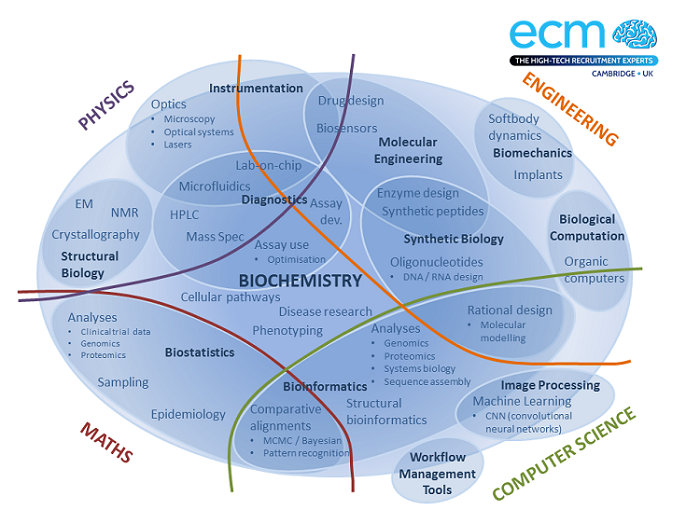There will always be a place for clinical trials and drug development with big pharma interested in the next-big-blockbuster, but nowadays the pharmaceutical sector is not the only applied life science area for academic scientists wanting to stay in the science sector to transition to.
The modern life scientist is gaining experience and knowledge in other applied areas, and could be now termed an “Engineering Scientist”. This is the archetypal modern PhD, armed with multiple strings-to-their-bow, and who can apply their broad skills on complex problems, side-by-side with computational and physical approaches.
Engineering Science, Bioinformatics and Assay Development
ECM also monitor the job market, and we’re aware how industry has embraced new hybrid projects and the emergence of multi-disciplinary roles being recruited for. With this in mind, here’s our snapshot on what the job market is looking for:

Figure 1. How the subject of biochemistry / biologics interplays with other disciplines and gives rise to new technology areas and applications.
Biophysicists – Typically have a physics background working on bio-related projects including structural biology (NMR, x-ray crystallography, EM, AFM etc…), may have developed / designed related components. Broad skills with computational modelling, sample preparation, and complex instrumentation usage.
Instrumentation Developers / Scientists – Another typically from a physics or engineering background developing scientific instruments, test-rigs or components for life science applications. Will invariably utilise knowledge of optics or microfluidics and could be working on the development of PoC diagnostics, lab-on-a-chip technology, or microscopy / spectrophotometry based instruments.
Assay Development Scientists – A close relation to an Instrumentation Developer / Scientist, projects will be more biologics oriented including the development of specific assays found in instruments / chips. This is very different from users of assays working on research projects or optimising assays.
Synthetic Biologists – Closest in nature to a traditional Biochemist / Life Scientist profile, the role is looking to develop and engineer DNA or protein based complexes for specific functionality such as drug delivery / design, organic catalytic reactions, therapeutics or molecular modelling.
Bioengineers – Broad term covering physical / engineering aspects of biological based projects including biosensors (which could closely work with physics) and biological computation development (use of DNA as data storage).
Biomechanics – A mechanical engineering perspective on biological functions such as gait analysis and location; implants, orthotics and prosthesis; and at the micro level, stresses and strains between or within cells.
Bioinformatics – An interdisciplinary field using software / computer science tools to understand biological based data. This can include molecular modelling through rational design and also statistical comparative analyses especially for genomics and proteomics. Can overlap with machine learning for image processing / identification.
Biostatistics – A statistical approach to biological problems including quantitative analysis, and clinical trial data. Usually large data sets so statistical tests provide significance to work and can impact future predictions or help build data based models.
There has been a large influx of recruitment in many of these roles, where companies are looking for scientists with complementary skills in a range of areas. Pure biology based research roles in industry are rare, but this does not mean that a PhD is not of value. On the contrary, many companies are keen on advanced degree holders (especially PhDs) where there have honed their skills on complex projects. Their commitment to work on their (doctorate) projects can be seen as transitional experience, where that knowledge provides gravitas and a sound background for technical dialogue.
Our take home message is to reflect on yourself whilst you are at university, and make sure the years of effort you are putting into your course has more weight and substance for your future than just the grade attainment you can get. Are you gaining the experience and technical skills that employers will find interesting? Are you carving yourself a niche specialisation or do you have broader skills that a wider selection of employers will find desirable. The job market will always be competitive, but the savvy future-planning person can increase their chances.
Full article can be downloaded here.
About ECM
ECM is a specialised science and technology recruitment consultancy, helping bright candidates find exciting roles in science, computing and engineering. We work closely with candidates to help you get the job you’re after, and can advise on all aspects of your application to maximise your impact with a hiring manager. If you liked this article, and want to see how we can help you when you’re next looking to move on, why not get in touch: info@ecmselection.co.uk.


